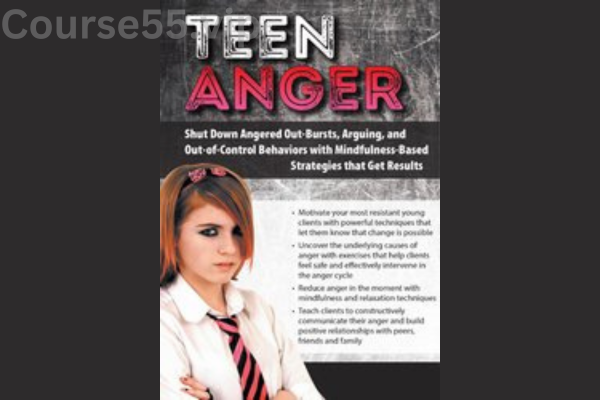Teen Anger: Shut Down Angered Out-Bursts, Arguing, and Out-of-Control Behaviors with Mindfulness-Based Strategies that Get Results By Jason Murphy – PESI
$249.00 Original price was: $249.00.$23.10Current price is: $23.10.
Teen anger: shut down angered out-bursts, arguing, and out-of-control behaviors with mindfulness-based strategies that get results

Teen Anger: Shut Down Angered Out-Bursts, Arguing, and Out-of-Control Behaviors with Mindfulness-Based Strategies that Get Results By Jason Murphy – PESI
Overview

Managing Teen Anger: Mindfulness-Based Techniques to Curb Outbursts, Arguments, and Disruptive Behaviors
Teenagers frequently experience a surge of emotions that can result in anger, outbursts, and behavioral challenges. This emotional turbulence can be overwhelming for both teens and the adults guiding them. In Managing Teen Anger: Mindfulness-Based Techniques to Curb Outbursts, Arguments, and Disruptive Behaviors, Jason Murphy presents a structured approach to understanding and addressing adolescent anger using mindfulness techniques. This course is not merely theoretical; it provides parents, educators, and mental health professionals with hands-on strategies that promote positive behavioral changes and improved communication.
Designed to tackle the complexities of teenage anger, the program introduces techniques that encourage emotional regulation and healthier ways to express emotions. By incorporating mindfulness practices, participants can guide adolescents toward managing their emotions in a constructive manner. The course offers various tools, including grounding exercises and communication strategies, to help reduce conflicts and build resilience.
Understanding the Roots of Teen Anger
Teen anger often stems from feelings of unfairness, high-stress levels, or discomfort in social settings. Recognizing these underlying triggers is essential for effective intervention. Jason Murphy’s course delves into these complexities, providing a systematic approach to identifying the causes of anger and guiding participants in developing strategies to address them.
Teenagers navigate a developmental stage marked by identity formation and increasing independence, which can lead to unpredictable emotional responses. If left unmanaged, these emotions may result in disruptive behavior. The course promotes mindfulness-based strategies to help teens not only address anger but also gain a broader awareness of their emotional landscape. Encouraging self-awareness and emotional intelligence enables adolescents to better understand their feelings and how those emotions influence their actions.
Furthermore, the course emphasizes the role of communication in anger management. By fostering open discussions about emotions, participants can equip teens with the ability to articulate their frustrations rather than resorting to aggressive or inappropriate reactions. This combination of emotional awareness and improved communication skills creates a solid foundation for addressing and diffusing anger-related incidents.
Proven Mindfulness Techniques for Anger Management
At the heart of Jason Murphy’s course are scientifically supported mindfulness techniques that enhance anger regulation and promote healthier coping strategies. Mindfulness encourages individuals to stay present, improving their ability to recognize emotions as they arise and respond thoughtfully rather than react impulsively.
Some of the core techniques covered include deep breathing, meditation, and grounding exercises. For example, participants learn how deep breathing can help teens slow their heart rate, fostering a sense of calm before they act on their emotions. Grounding techniques, such as tactile exercises or focusing on background sounds, assist in redirecting attention away from anger and toward the present moment, creating a greater sense of control.
Additionally, the course introduces self-soothing techniques that can be applied during moments of heightened stress. These include visualization of calming environments, engaging in physical activities, or using affirmations to encourage positive self-talk. The strategies presented are tailored to suit the specific needs of teenagers, ensuring that they can be seamlessly incorporated into daily routines.
Practical Tools and Interactive Exercises
The course includes a range of hands-on exercises designed to actively engage participants and reinforce mindfulness practices. These interactive activities not only aid in understanding the concepts but also ensure that they are effectively implemented in real-life situations.
One approach involves role-playing exercises where participants simulate typical conflicts with teenagers. These scenarios provide an opportunity to practice effective communication techniques, enabling participants to respond calmly and constructively rather than react impulsively. By engaging in these exercises, individuals gain confidence in managing challenging interactions.
Another aspect of the course focuses on integrating mindfulness techniques into everyday routines. Setting aside dedicated time for reflection or creating a designated calming space at home can reinforce emotional regulation strategies. These ongoing practices ensure that the mindfulness techniques taught in the course become sustainable habits for long-term anger management.
Enhancing Communication for Conflict Resolution
A crucial component of anger management is effective communication. Jason Murphy’s course underscores the significance of fostering open and honest discussions about emotions, particularly anger. By developing better communication skills, caregivers can support teenagers in expressing their emotions in a constructive and non-confrontational manner.
The course also highlights the importance of identifying emotional triggers. Recognizing what provokes anger allows both teens and adults to address these triggers proactively. Techniques such as active listening, reflective responses, and demonstrating empathy help strengthen understanding and reduce conflicts.
Additionally, the program explores how tone and body language influence conversations. By modeling calm and positive communication habits, adults can set an example for teenagers, encouraging respectful discussions rather than heated arguments. This shift in interaction fosters emotional intelligence and promotes healthier ways to navigate conflicts.
Applying Strategies in Real-Life Situations
One of the most valuable aspects of the course is its emphasis on real-world application. Jason Murphy incorporates case studies and interactive exercises to illustrate how mindfulness techniques can be implemented in everyday situations. This practical approach not only reinforces learning but also instills confidence in using these strategies effectively.
By analyzing case studies, participants examine which anger management strategies were successful and identify areas for improvement. This analytical perspective deepens understanding and enables participants to adapt mindfulness techniques to their specific circumstances.
Role-playing activities further bridge the gap between theory and practice. By simulating common challenges, participants refine their ability to manage tense situations, ensuring that they can apply mindfulness techniques with confidence when real conflicts arise.
Intended Audience
This course is designed for a broad audience, including parents, educators, and mental health professionals, all of whom play a vital role in shaping adolescent behavior and emotional regulation.
• Parents gain practical insights into improving their relationships with their teenagers, helping them navigate the emotional challenges of adolescence with greater understanding and patience.
• Educators benefit by acquiring tools to create a positive and emotionally supportive classroom environment. These strategies can be incorporated into school programs to promote student well-being and conflict resolution.
• Mental health professionals can enhance their therapeutic approaches by integrating mindfulness-based interventions into their practice, offering clients new, effective techniques for managing teen anger and emotional distress.
About the Instructor
Jason Murphy brings over two decades of experience as a mindfulness-based psychotherapist specializing in adolescent and family therapy. His expertise in behavioral science, combined with his extensive work in mindfulness practices, establishes his credibility as an authority in anger management and emotional regulation.
Murphy’s commitment to enhancing adolescent emotional well-being is evident throughout the course. By balancing theoretical knowledge with actionable techniques, he ensures that participants not only understand mindfulness-based strategies but also feel equipped to apply them effectively. This practical focus reinforces the core message of the program: that mindfulness can lead to meaningful, lasting improvements in managing teen anger.
Conclusion
In an environment where teenage anger often leads to strained relationships and communication breakdowns, Managing Teen Anger: Mindfulness-Based Techniques to Curb Outbursts, Arguments, and Disruptive Behaviors provides an essential resource. By equipping parents, educators, and mental health professionals with practical, research-backed strategies, this course promotes emotional intelligence and resilience in adolescents.
The integration of mindfulness with hands-on applications ensures that these techniques are both effective and sustainable. Testimonials from past participants emphasize the success of these mindfulness strategies in reducing outbursts and improving communication, ultimately fostering healthier interactions and emotional well-being for both teens and the adults who support them.
Frequently Asked Questions:
Business Model Innovation: We operate a group buying strategy, allowing participants to share costs and access popular courses at reduced prices. This model benefits individuals with limited financial resources, despite concerns from content creators about distribution methods.
Legal Considerations: The legality of our operations involves complex issues. Although we don’t have explicit permission from course creators to resell their content, there are no specific resale restrictions stated at the time of purchase. This ambiguity creates an opportunity for us to provide affordable educational resources.
Quality Control: We ensure that all course materials purchased are identical to those offered directly by the creators. However, it’s important to understand that we are not official providers. As such, our offerings do not include:
– Live coaching calls or sessions with the course author.
– Access to exclusive author-controlled groups or portals.
– Membership in private forums.
– Direct email support from the author or their team.
We aim to reduce the cost barrier in education by offering these courses independently, without the premium services available through official channels. We appreciate your understanding of our unique approach.
Be the first to review “Teen Anger: Shut Down Angered Out-Bursts, Arguing, and Out-of-Control Behaviors with Mindfulness-Based Strategies that Get Results By Jason Murphy – PESI” Cancel reply
You must be logged in to post a review.

















Reviews
There are no reviews yet.